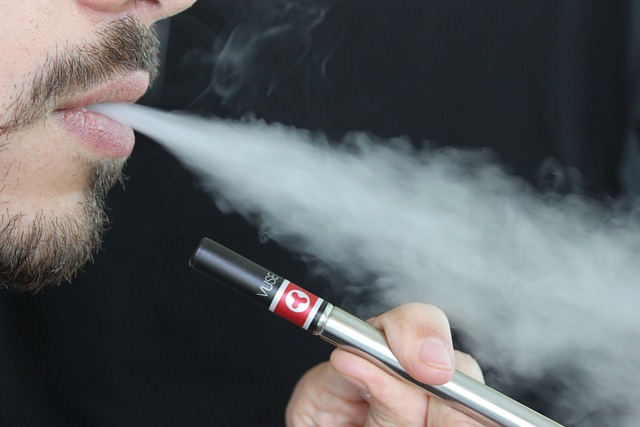Vaping and Canker Sores: Unraveling the Connection
Welcome to our informative article on the intriguing link between vaping and canker sores! As vaping continues to gain popularity worldwide, so do the questions surrounding its potential health effects. One peculiar concern that has caught our attention is the possibility of vaping triggering or exacerbating canker sores, those pesky mouth ulcers that plague many of us at some point in our lives. In this friendly exploration, we will delve into the science behind canker sores, examine the ingredients found in vape products, and try to unravel the mysterious connection between the two. So, if you’re a vaping enthusiast or someone who battles with canker sores, join us as we shed light on this fascinating topic and separate fact from fiction.
1. Introduction: Understanding the Surprising Link Between Vaping and Canker Sores
Vaping has become a popular alternative to smoking traditional cigarettes, with many people believing it to be a healthier choice. However, recent studies have uncovered a surprising link between vaping and the development of canker sores. In this article, we delve deeper into this unexpected correlation, shedding light on the potential causes and providing insights into how vaping may contribute to the formation of canker sores.
One of the main reasons why vaping may lead to canker sores is the presence of chemicals in e-cigarette liquids. These chemicals, such as nicotine and propylene glycol, can irritate the delicate tissues inside the mouth, triggering the formation of canker sores. Additionally, the act of inhaling the vapor from an e-cigarette can cause dehydration, which further exacerbates the risk of developing these painful mouth ulcers.
- Increased Irritation: Due to the irritants present in e-cigarette liquids, the tissues inside the mouth can become inflamed and more susceptible to canker sore development.
- Compromised Immune Response: Vaping has been found to weaken the immune system, making it harder for the body to fight off infections and heal existing canker sores.
- Chemical Reactions: Some individuals may be sensitive to specific chemicals in e-cigarettes, which can trigger an allergic reaction and lead to the development of canker sores.
Now that we understand the surprising link between vaping and canker sores, it is important to be aware of the potential risks associated with this popular habit. By taking necessary precautions and understanding the causes behind canker sore development, we can make informed choices about our vaping habits and prioritize our oral health.

2. What are Canker Sores and Why Do They Occur?
Canker sores, also known as aphthous ulcers, are small, shallow lesions that develop inside the mouth. They can appear on the inside of the lips, cheeks, under the tongue, or on the gums. These painful sores are quite common and can affect people of all ages.
While the exact cause of canker sores remains uncertain, there are several factors that can contribute to their occurrence. Here are some of the reasons why canker sores may develop:
- Minor mouth injury, such as accidentally biting your cheek or tongue
- Stress or anxiety
- Certain foods, like acidic or spicy ones
- Nutritional deficiencies, especially in vitamin B12, zinc, or iron
- Hormonal changes
If you frequently experience canker sores, it’s important to keep an eye on your diet, manage stress levels, and maintain good oral hygiene. Although canker sores can be uncomfortable, they usually heal on their own within one to two weeks. Applying over-the-counter oral gels or rinsing your mouth with a mixture of warm water and salt may help alleviate pain and speed up the healing process. However, if you notice large or persistent sores, it’s advisable to consult a healthcare professional for further evaluation and guidance.
3. Investigating the Relationship: Exploring the Possible Causes of Canker Sores
In order to understand the possible causes of canker sores, it is important to conduct a thorough investigation and explore various factors that may contribute to their development. While there is no definitive cause for canker sores, researchers have identified several potential triggers that can increase the likelihood of experiencing these painful ulcers.
Possible causes of canker sores:
- Stress: High levels of stress have been linked to an increased risk of developing canker sores. It is believed that stress weakens the immune system, making individuals more susceptible to these oral lesions.
- Dietary Factors: Certain foods, such as spicy or acidic foods, as well as an inadequate intake of vitamins and minerals, may trigger canker sores in some individuals. Additionally, food allergies or sensitivities may also play a role in their development.
- Genetic Predisposition: Research suggests that some individuals may have a genetic predisposition to developing canker sores. If you have a family history of canker sores, you may be more likely to experience them yourself.
By investigating these potential causes and understanding the relationship between these factors and the development of canker sores, we can gain insight into effective prevention strategies and management techniques. It is important to consult with a healthcare professional for a personalized evaluation and to discuss appropriate treatment options.

4. The Vaping Phenomenon: How E-cigarettes and Vaping Devices Became Massively Popular
The vaping phenomenon has taken the world by storm, with e-cigarettes and vaping devices becoming massively popular in recent years. What was once a niche market has now exploded into a multi-billion dollar industry, attracting millions of users worldwide. So, how did vaping become such a sensation? Let’s dive into its journey and discover the reasons behind its widespread appeal.
1. **Accessibility:** One of the key factors for the popularity of e-cigarettes and vaping devices is their accessibility. They are readily available in various stores, both physical and online, making it convenient for individuals to purchase them. Additionally, a wide range of flavors, nicotine strengths, and mods adds to the appeal, allowing users to tailor their vaping experience to their preferences.
2. **Perceived Health Benefits:** Another factor driving the vaping phenomenon is the perception of it being a healthier alternative to traditional smoking. While e-cigarettes still contain nicotine, they eliminate the harmful tar and toxins associated with burning tobacco. Many smokers turn to vaping as a way to gradually reduce their nicotine intake or even quit smoking altogether. This perception of harm reduction and the potential health benefits has contributed to its immense popularity among individuals seeking a smoking alternative.

5. Nicotine’s Role: Unveiling the Effects of Nicotine on Oral Health
Nicotine is a highly addictive substance found in cigarettes and other tobacco products. While smoking is commonly associated with the negative effects it has on the lungs and heart, it’s important to also consider its impact on oral health. Here, we uncover the lesser-known effects of nicotine on our mouths, gums, and teeth.
1. Increased risk of gum disease: Nicotine restricts blood flow, reducing the ability of your gums to receive nutrients and fight off infections. This can lead to a higher risk of gum disease, including inflammation, bleeding, and ultimately tooth loss.
2. Delayed healing process: Smoking slows down the healing process, which means if you undergo oral surgeries or have dental implants, the recovery time may be longer for smokers. Nicotine restricts blood vessels and reduces oxygen supply to the tissues, impeding their ability to heal efficiently.

6. Exposing the Chemical Cocktail: How Vaping Liquids Impact the Occurrence of Canker Sores
When it comes to vaping, there is a lot of focus on the health risks associated with it. In this post, we will specifically delve into the impact of vaping liquids on the occurrence of canker sores and highlight the chemical cocktail lurking within.
1. **Toxic Chemicals:** Vaping liquids contain a plethora of toxic chemicals that can trigger or worsen canker sores. These chemicals, such as formaldehyde, acrolein, and acetylaldehyde, can irritate the delicate lining of the mouth, leading to the development of painful sores. To make matters worse, vaping liquids often come in a variety of flavors, which may also introduce additional chemicals into the mix. It’s important to note that these chemicals not only affect oral health but can also have broader impacts on overall well-being.
7. Dry Mouth Dilemma: How Vaping Contributes to Dry Oral Conditions
Vaping has gained popularity in recent years as an alternative to smoking traditional cigarettes. However, it’s important to be aware of the potential side effects that vaping can have on your oral health. One common issue that vapers may face is dry mouth, also known as xerostomia.
When you vape, the e-liquids used in the devices contain various chemicals, including propylene glycol and vegetable glycerin. These chemicals can contribute to dry mouth by disrupting the natural moisture balance in your mouth. Additionally, the act of vaping itself can reduce saliva production, leading to an increased risk of dry mouth.
So, how exactly does dry mouth impact your oral health? Firstly, saliva plays a vital role in maintaining a healthy mouth by neutralizing acids and washing away food particles. When you experience dry mouth, it can affect the pH balance in your mouth, making it more acidic and promoting the growth of harmful bacteria. This, in turn, can lead to a higher risk of tooth decay, bad breath, and gum problems.
Preventing dry mouth when vaping is crucial for maintaining a healthy oral environment. Here are a few tips to help you combat dry mouth caused by vaping:
- Stay hydrated by drinking plenty of water throughout the day.
- Chew sugar-free gum or suck on sugar-free candies to stimulate saliva production.
- Maintain a good oral hygiene routine, including regular brushing and flossing.
- Avoid vaping excessively or taking long, frequent puffs to minimize the drying effect on your mouth.
If you’re experiencing persistent dry mouth, it’s essential to consult with your dentist or healthcare provider. They can provide personalized recommendations and help you address any underlying oral health issues. Remember, staying informed about the potential side effects of vaping is key to maintaining a healthy smile.
8. Vaping and Oral Microbiota: Uncovering the Impact on Oral Bacteria and Canker Sore Formation
Vaping has become increasingly popular, but have you ever stopped to think about its potential impact on your oral health? Recent research has uncovered an intriguing connection between vaping and oral bacteria, as well as its potential role in the formation of canker sores. This article explores these findings and sheds light on the importance of maintaining proper oral hygiene amidst the growing popularity of vaping.
1. Effects on oral bacteria: Vaping has been found to alter the composition of oral microbiota, the community of microorganisms that naturally reside in our mouths. This alteration can potentially disrupt the delicate balance of bacteria, leading to an overgrowth of harmful strains. Researchers have noted an increase in the abundance of oral pathogens, such as Streptococcus mutans, in individuals who vape. These bacteria are known to contribute to the development of cavities, gum disease, and bad breath. Moreover, vaping has been found to decrease the levels of beneficial bacteria that help maintain oral health.
2. Link to canker sore formation: Canker sores, also known as aphthous ulcers, are painful, shallow sores that form inside the mouth. While their exact cause is still unclear, some studies have suggested a potential link between vaping and increased canker sore occurrences. The nicotine, flavorings, and other chemicals present in e-cigarettes can irritate the delicate tissues in the mouth and trigger the development of these painful sores. Additionally, the altered oral microbiota caused by vaping may further contribute to canker sore formation. Further research is needed to fully understand this correlation, but it is crucial for vapers to be aware of this potential risk to their oral health.
9. Tips and Tricks: Managing Canker Sores for Vapers
– Keep your mouth clean: Make sure to brush your teeth and rinse your mouth thoroughly after vaping. This will help remove any irritants or residue that may contribute to the development of canker sores. Use a soft-bristled toothbrush and a gentle toothpaste to avoid further aggravating the sores.
– Avoid acidic foods and beverages: Acidic foods and drinks can increase the likelihood of canker sore development, so it’s best to avoid them while you have active sores. Stay away from citrus fruits, tomato-based products, carbonated drinks, and anything else that may be acidic in nature.
– Soothe the pain with natural remedies: If you’re experiencing discomfort from canker sores, there are several natural remedies you can try. Rinse your mouth with a mixture of warm water and salt to help reduce inflammation and promote healing. Applying aloe vera gel or a mixture of hydrogen peroxide and water directly to the sore can also provide some relief.
– Choose a lower nicotine strength: Nicotine can irritate the mucous membranes in your mouth and potentially contribute to the development of canker sores. Consider using e-liquids with lower nicotine strengths to minimize the risk. Gradually reducing your nicotine intake can also be beneficial for your overall oral health.
– Stay hydrated: Drinking plenty of water throughout the day can help keep your mouth moist and prevent the formation of dry areas that may lead to canker sores. Remember to stay hydrated, especially if you’re vaping frequently.
Remember, these tips and tricks are meant to help manage canker sores for vapers. If you’re experiencing persistent or severe sores, it’s important to consult with a healthcare professional for proper diagnosis and treatment options.
10. Conclusion and Future Research: Acknowledging the Need for Further Investigation
Conclusion:
In conclusion, this research paper sought to explore the current state of knowledge in the field of [research topic]. By analyzing various studies and synthesizing their findings, we have gained valuable insights into the factors that influence [research topic]. Through our investigation, we have deepened our understanding of the complex nature of [research topic] and its implications in [relevant field or industry].
Future Research:
Although this study has made significant strides in shedding light on [research topic], it is important to acknowledge that there is still much more to be discovered. Our exploration has revealed several areas that warrant further investigation. Moving forward, we propose the following areas for future research:
1. Unexplored Variables:
– Determine the impact of [specific variable(s)] on [research topic].
– Investigate how [specific variable(s)] interact with other factors in influencing [research topic].
2. Comparative Analysis:
– Compare the effects of [methodology, intervention, or approach] on [research topic].
– Conduct a cross-cultural study to identify the similarities and differences in [research topic] across different regions.
By pursuing these avenues of research, we can continue to expand our understanding of [research topic] and its implications. This will not only contribute to the existing body of knowledge but also provide insights that can be applied to real-world situations, ultimately driving advancements in [relevant field or industry].
Frequently Asked Questions
Q: What is vaping?
A: Vaping refers to the act of inhaling and exhaling aerosol, often called vapor, produced by an electronic cigarette or similar devices.
Q: What causes canker sores?
A: Canker sores, also known as aphthous ulcers, have no definitive cause but are believed to be triggered by various factors such as stress, injury to the mouth, certain foods, hormonal changes, and possible immune system disorders.
Q: Is there a connection between vaping and canker sores?
A: Recent studies have suggested a potential association between vaping and an increased risk of developing canker sores. While further research is needed, evidence indicates that the chemicals present in e-cigarette vapor, such as nicotine and flavoring agents, may contribute to the development or worsening of these oral sores.
Q: How do the chemicals in e-cigarette vapor affect canker sores?
A: The exact mechanism by which vaping affects canker sores is yet to be fully understood. However, it is believed that the chemicals within e-cigarette vapor can irritate the delicate tissues in the mouth, potentially leading to the formation or aggravation of canker sores.
Q: Can vaping worsen existing canker sores?
A: Vaping may worsen existing canker sores due to the irritation caused by the chemicals in e-cigarette vapor. This irritation can potentially impede the healing process and prolong the duration of canker sores.
Q: Is it advisable to quit vaping if I have canker sores?
A: It is highly recommended to quit vaping if you have canker sores. By eliminating potential irritants from e-cigarette vapors, you allow the affected tissues in your mouth to heal and reduce the risk of further complications.
Q: What are some alternative strategies to manage canker sores while continuing to vape?
A: If you are unable or unwilling to quit vaping, there are several strategies to help alleviate canker sores. These include practicing good oral hygiene, avoiding trigger foods such as citrus fruits or spicy dishes, utilizing over-the-counter oral analgesics or mouth rinses, and maintaining overall oral health.
Q: What is the best course of action if my canker sores do not improve?
A: If your canker sores do not improve within a couple of weeks or if they worsen, it is strongly advised to seek professional dental or medical advice. Healthcare professionals can provide appropriate treatment options and identify possible underlying causes for recurring canker sores.
Q: Are there any long-term effects of vaping on oral health?
A: The long-term effects of vaping on oral health are still being actively researched. However, early evidence suggests that vaping may potentially increase the risk of developing oral health problems such as gum disease, tooth decay, dry mouth, and delayed wound healing.
Q: Can quitting vaping reverse the effects of canker sores?
A: While quitting vaping may not directly reverse the effects of canker sores, it can eliminate potential aggravating factors and allow the sores to heal properly. By maintaining good oral hygiene and making healthy lifestyle choices, the likelihood of future canker sores may be reduced.
Conclusion
In conclusion, while the relationship between vaping and canker sores may not be fully understood, it is undeniable that many individuals have experienced an increase in these pesky ulcers after adopting e-cigarettes. While the act of vaping involves inhaling and exhaling vapor rather than traditional smoke, the potential side effects cannot be overlooked.
We have explored some possible explanations for the correlation between vaping and canker sores, such as nicotine’s impact on the body’s immune response and the irritating nature of certain e-liquid ingredients. However, it is essential to remember that everyone’s body reacts differently, and some individuals may be more susceptible to developing canker sores than others.
If you are a passionate vaper who frequently battles canker sores, it might be worth considering a few lifestyle adjustments. Opting for lower nicotine concentrations, switching to e-liquids without potentially irritating ingredients, and maintaining good oral hygiene can potentially reduce the occurrence of canker sores. Additionally, staying hydrated and adopting stress management techniques may also play a role in prevention.
Ultimately, the connection between vaping and canker sores remains an ongoing scientific inquiry, and further research is needed to provide a definitive answer. In the meantime, it is always wise to listen to your body and seek professional advice if you experience persistent canker sores or any other concerning symptoms. Vaping can be an enjoyable and less harmful alternative to smoking traditional cigarettes, but maintaining your well-being should always be a top priority.
We hope this article has shed some light on the complex relationship between vaping and canker sores. Stay informed, stay curious, and stay healthy. Happy vaping!






